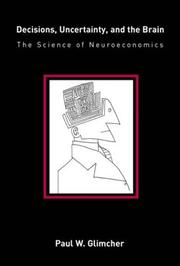Check nearby libraries
Buy this book

In this work, Paul Glimcher argues that economic theory may provide an alternative to the classical Cartesian model of the brain and behavior. Ren Descartes (1596-1650) believed that all behaviors could be divided into two categories, the simple and the complex. Simple behaviors were those in which a given sensory event gave rise deterministically to an appropriate motor response. Complex behaviors were those in which the relationship between stimulus and response was unpredictable. These behaviors were the product of a process that Descartes called the soul, but that a modern scientist might call cognition or volition. Glimcher argues that Cartesian dualism operates from the false premise that the reflex is able to describe behavior in the real world that animals inhabit. A mathematically rich cognitive theory, he claims, could solve the most difficult problems that any environment could present, eliminating the need for dualism by eliminating the need for a reflex theory. Such a mathematically rigorous description of the neural processes that connect sensation and action, he explains, will have its roots in microeconomic theory. Economic theory allows physiologists to define both the optimal course of action that an animal might select and a mathematical route by which that optimal solution can be derived. Glimcher outlines what an economics-based cognitive model might look like and how one would begin to test it empirically. Along the way, he presents a fascinating history of neuroscience. He also discusses related questions about determinism, free will, and the stochastic nature of complex behavior.
Check nearby libraries
Buy this book

Previews available in: English
Subjects
Neuroeconomics, Dualism, Reflexes, Microeconomics, Brain, mathematical models, Cognitive neuroscience, Brain, Mathematical models, Mental Processes, Physiology, Reflex, Neurosciences cognitives, Cerveau, Modèles mathématiques, Microéconomie, Réflexes, Dualisme, SCIENCE, Cognitive Science, PSYCHOLOGY, Cognitive Psychology, Entscheidungsverhalten, Kognitionswissenschaft, Kognitive Psychologie, Neuropsychologie, Rational Choice, Neuroéconomie| Edition | Availability |
|---|---|
|
1
Decisions, Uncertainty, and the Brain: The Science of Neuroeconomics
2004, MIT Press
in English
0262273934 9780262273930
|
zzzz
|
|
2
Decisions, Uncertainty, and the Brain: The Science of Neuroeconomics (Bradford Books)
October 1, 2004, The MIT Press
Paperback
in English
0262572273 9780262572279
|
aaaa
|
|
3
Decisions, Uncertainty, and the Brain: The Science of Neuroeconomics
2004, MIT Press
in English
0262303620 9780262303620
|
zzzz
|
|
4
Decisions, Uncertainty, and the Brain: The Science of Neuroeconomics (Bradford Books)
March 1, 2003, The MIT Press
Hardcover
in English
0262072440 9780262072441
|
zzzz
|
|
5
Decisions, Uncertainty, and the Brain: The Science of Neuroeconomics
2003, MIT Press
in English
058544496X 9780585444963
|
zzzz
|
|
6
Decisions, uncertainty, and the brain: the science of neuroeconomics
2002, MIT Press
in English
0262072440 9780262072441
|
zzzz
|
Book Details
Classifications
The Physical Object
Edition Identifiers
Work Identifiers
Community Reviews (0)
History
- Created April 30, 2008
- 9 revisions
Wikipedia citation
×CloseCopy and paste this code into your Wikipedia page. Need help?
| February 27, 2023 | Edited by ImportBot | import existing book |
| September 28, 2021 | Edited by ImportBot | import existing book |
| August 19, 2020 | Edited by ImportBot | import existing book |
| August 12, 2010 | Edited by IdentifierBot | added LibraryThing ID |
| April 30, 2008 | Created by an anonymous user | Imported from amazon.com record |











